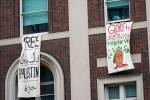EDITORIAL: Another trademark ruling upholds the First Amendment
In a victory against government censorship, the Supreme Court in June unanimously threw out a law that allowed the U.S. Patent and Trademark Office to deny trademarks that it deemed “disparaging.”
The case involved the Asian-American rock band The Slants. Writing for the court, Justice Samuel Alito concluded, “The disparagement clause violates the First Amendment’s free speech clause. Contrary to the government’s assertion, trademarks are private, not government speech.”
But the same statute also allowed federal bureaucrats to refuse trademark protection for “immoral, deceptive, or scandalous” reasons. Last week, however, a federal appeals court struck that down, too.
This case involved an attempt by Erik Brunetti to register the trademark “fuct” for a clothing brand he created in 1990. His effort was denied in 2011, and he went to court.
In defense of the law, federal lawyers argued that trademark registration was akin to “limited public forums” which the “government can open up for private speech but in a content-based (though viewpoint-neutral) way,” writes law professor Eugene Volokh in his blog.
But a three-judge panel of the U.S. Court of Appeals for the Federal Circuit rejected that view, ruling instead that limits on trademarks were essentially limits on free speech.
“The Supreme Court has found the existence of a limited public forum only when the government restricts speech on its own property,” such as military bases or airport terminals, Judge Kimberly Moore wrote for the court.
The judges also noted the “immoral, deceptive, or scandalous” clause was open to wide interpretation and standards are constantly changing as society evolves. “Nearly identical marks have been approved by one examining attorney and rejected as scandalous or immoral by another.”
Indeed, a statute that gives the administrative state such wide latitude to make decisions regarding private messages on a mere whim clearly runs afoul of the Constitution’s free speech protections.
“There are words and images that we do not wish to be confronted with, not as art, nor in the marketplace,” Judge Moore wrote. “The First Amendment, however, protects private expression, even private expression which is offensive to a substantial composite of the general public.”
The opinion further fortifies the Bill of Rights against the increasingly common and disturbing calls to ban “offensive” speech. It should be required reading on college campuses across the land.




























